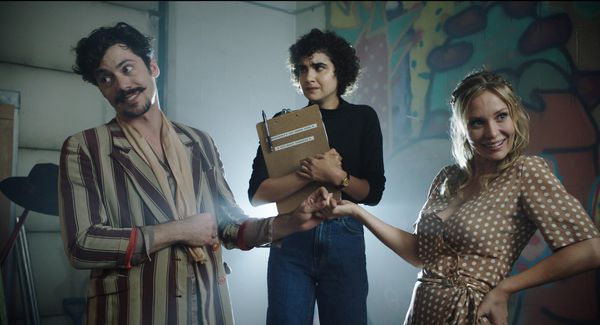 |
| Stephen Friedrich, Sarah Yarkin and Tara Holt in Tankhouse |
Fargo, North Dakota, is the stage for two New York blacklisted theatre artists, Tucker (Stephen Friedrich) and Sandrene (Tara Holt), to pursue their dream of an "artistic revolution.” Director Noam Tomaschoff and co-writer Chelsea Frei’s feature debut is adapted from their earlier improv short, and stars Christopher Lloyd, who banishes the pair from the New York scene, and Richard Kind as Mortensen, who lives with the burden of broken dreams.
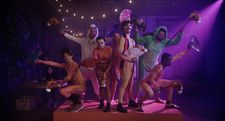 |
| Putting on a show |
In conversation with Eye For Film, Tomaschoff and Frei discussed the irony behind Tankhouse, compromising their artistic expression, and the burden of the creative dream.
Paul Risker: Behind the onscreen story, there’s the story of the making of the film. Are there any tales, or, moments you recall that might surprise the audience to know?
Noam Tomaschoff: … When you do a first feature, the perceived wisdom is to make it as simple for yourself as possible - then you can spend as much of the little time you have, executing your vision. “Have a couple of characters, three or four, keep it small, keep it convenient, shoot it in town.” “No,” we said. "Let’s have fourteen characters and show all their reactions all of the time. Let’s shoot it in the middle of the upper Midwest”, which is an awesome location, but doesn't have any of the resources that you'd expect from a production centre. For example, gear rentals, or, a crew base. There's certainly crew there, but not as many as in Los Angeles, Atlanta or New York.
There were advantages to shooting out there, like the access to all the different locations and their uniqueness, which you wouldn't find anywhere else. It was challenging because we had to take the whole circus there.
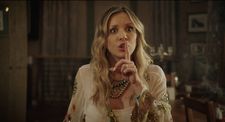 |
| Tara Holt in Tankhouse |
Chelsea Frei: This was based on a short that Noam and I did right before we left New York. We were moving to LA and we had a sketch comedy group. We thought for one last hoorah we'd do this fun little short where we played the crazy versions of ourselves. We told all our favourite comedians to play the most annoying person they met at acting school.
We shot this short for an hour and a half. It was fun, but it made no sense. We ended up submitting it to a film festival and we got in, and that's when we got our financiers, and started writing the feature.
This is where it goes to show we were in New York struggling to fit in. We were throwing eight different projects at the wall and this was our passion project, our baby, that we never saw going anywhere. And of course, that's the one thing that people ended up being interested in.
Looking back that's why it worked so well, because it was made out of love. We had no care in the world for what happened to it and people responded. When we started writing the feature version, and there was money behind it for the first time in our careers, it was trying to balance keeping the fun and the love, not giving a shit if it's not everybody's taste, while also keeping our investors happy - making something that's hopefully viable and people would want to see. This is where those two worlds collided.
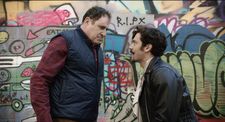 |
| Richard Kind and Stephen Friedrich in Tankhouse |
PR: Making a film is the act of compromise, especially in consideration of the audience and the process of balancing artistic expression with the business side of film.
NT: One of the things new to us in the beginning of the process was the idea of trying to use some of the budget to attract a larger name. Clearly it’s a huge honour and boon to the whole process to work with somebody who has all this experience. From the business side of things it makes the film attractive to buyers. In the post-production and sales process, it has been about hearing the colder business perspectives, like how to market a movie.
You might have all these ideas about how the artwork should look, and how we should market it, but at the end of the day when you're looking at a spreadsheet, the things that really matter often aren't the same as the ones that matter to your artistic expression. It goes along with the broader concept in the arts of the freedom in form. You need to find a way to express yourself within a certain budget and within all types of parameters. The business requirements are just another parameter to find yourself in.
We had a tonne of leeway. This was not the strictest production, of being dictated to from on high. As you can tell, the tone and look of the film goes all the way, and it doesn't pull any punches in terms of being what it is. Hopefully it strikes a balance with the business perspective because we do want people to see it. The only way it finds an audience is if it attracts one. If it's too esoteric and opaque on first glance, then it's impossible to do what it needs to do, and then why did we do it?
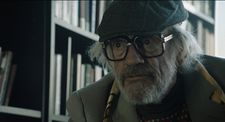 |
| Christopher Lloyd in Tankhouse |
CF: Noam and I always try to strike this balance. What I've always admired about him is that he wants to do what's best for the script, or, the art, and I’m always, "How are we going to make this commercially viable?” I'm always that person on the other side, sometimes to a fault.
This was a learning experience for us both to move more towards the centre. We were working with a first time producer. We didn't have Hollywood studio people navigating us towards maybe the hottest new thing. We were in the dark with a lot of that, and I'm not sure I should mention this, but it was the blind leading the blind.
We took big swings and a lot of them paid off. There were misses, but that's where we learned the most of bridging the gap between the commercial, and keeping our vision alive.
We lucked out with casting because everyone we got, especially those powerhouse names like Christopher Lloyd and Richard Kind, they elevated our script. We were never hiring people just for the name; we were hiring people because we admired them, and they added to the characters.
PR: What did the expanded cast for the feature bring to your creative vision, and were you able to carry the improvisational style over from the short?
 |
| Rachel Matthews in Tankhouse |
CF: The casting was the hardest part, and now, it’s the most rewarding. These characters were all loosely based off of not people we know, but people we saw in our acting school, and worked with for many years in the New York theatre scene. The short we created was all improv, and when we started writing the feature script, it had a heightened sense of language, and wasn’t super improv based.
We were working fast, and it would’ve been the dream to have days where you could improvise and have fun. We didn't have that luxury, so a lot of decisions had to be made beforehand. One of the smart things Noam did was insist that we have rehearsals before we all got to Fargo.
NT: Movies where you can have the actors go for it, to see what comes out, and then put it all together, need to be low concept. A bunch of friends getting together for a bachelor party, you can improvise all day because the format is so broad it can support it. What we were doing here was so stylised that the bowl is a little more fragile. If you start to put too much into it, then it will likely break.
The way we allowed people to maintain that sense of expression was rehearsals, and because the people cast were already close to their roles, whatever they did was already in the ballpark.
PR: The appeal of Tankhouse is to go along for the ride with characters that dare to dream. We all have that dream, some of us have lost it, some are still chasing it, and some are yet to know that dream, but it's universally recognisable.
 |
| For the love of theatre |
NT: Lately, going over the film again, one of the things that stands out to me and a reason one might want to watch it, or, might enjoy it is the relationship between the main two characters. It explores the cost of pursuing your dream.
They have a choice – should they stand-down their individual needs to allow this partnership to continue, or, should they recognise at this point in their lives, their needs take precedence? Should they let go of this huge life partner, this emotional support, and cut themselves free to go in the opposite directions they need to go?
Western societies need these movies. Society needs people to do this kind of stuff because that's how we cope with living life, but I don't think a lot of people reflect on the personal cost of creating these types of things, and living these lives. I hope in how this relationship goes, people can reflect on the personal cost of pursuing a life in the arts.
CF: One of my favourite characters is Mortensen (Richard Kind). It’s because he represents somebody who did let his dream die, and is now suffering the consequences because he has never fully let it go. Richard does an amazing job of portraying that. He and Rachel Matthews have a couple of scenes together, that to me are heartbreaking because we all have those people in our lives.
When you finally let it go and see that you've held onto this anger for so long, how can you live a happy life if it's not how you wanted it to be? It’s one of my favourite storylines.
Tankhouse was released in US theatres and on VOD, 13th May 2022.





















